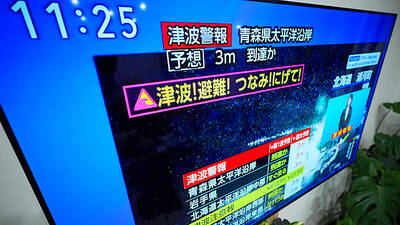Sinovac’s COVID-19 vaccine, under growing scrutiny over its effectiveness, has found a small but determined group of takers in Singapore — even though the country does not count them as being vaccinated in its official tally.
Singapore provides messenger ribonucleic acid (mRNA) shots from Pfizer-BioNTech and Moderna free under its national vaccination program, but thousands of people have paid as much as S$25 (US$18.5) for Sinovac’s CoronaVac.
“I personally don’t trust [mRNA] results, compared with something that is traditional, which has been used for over 100 years,” said Tan Bin Seng, a retired Singaporean doctor, referring to inactivated virus vaccines.

Photo: Reuters
Some see no downside to taking the Chinese-made vaccine, which is based on more established technology, as cases in Singapore are few.
They say that they are less confident in the long-term safety of newly developed mRNA vaccines.
Infectious-diseases specialist Leong Hoe Nam said that many of the locals signing up at his Rophi Clinic for Sinovac were in their 60s and echoed such fears.
Safety concerns have been amplified on social media, where locals share posts and experiences about the side effects of the mRNA vaccines.
Europe’s drug regulator last week said it had found a possible link between heart inflammation and mRNA COVID-19 vaccines from Pfizer-BioNTech and Moderna, in line with US findings last month, although both said that the benefits of the shots far outweigh the risks.
Allergic reactions have been also reported after mRNA shots.
So far, regulators have mostly raised concerns about Sinovac’s efficacy, and there have been few reports of adverse effects.
Private clinics in Singapore had given more than 17,000 doses of CoronaVac as of early this month.
More than 6 million total doses of mRNA vaccine have been given in the city-state and about 2.4 million people are fully vaccinated.
As of July 1, Pfizer had shipped more than 860 million doses of its COVID-19 vaccine worldwide.
Singapore, which has made vaccination a key pillar of its reopening plans, has reported many fewer cases than its neighbors, where fresh outbreaks have raised doubts about CoronaVac’s efficacy against new virus variants.
Thailand this week said it would use the AstraZeneca vaccine as a second dose for those who received the Sinovac shot, while Indonesia is considering a booster shot for those who received the two-dose Sinovac course.
The mRNA vaccines have shown efficacy rates of well over 90 percent against symptomatic disease in clinical trials, compared with trials for Sinovac that have shown results from as low as 51 percent to about 84 percent.
“There is no harm in taking Sinovac. Its efficacy rate may be relatively lower, but the risk of getting COVID-19 in Singapore is very low,” Singapore-based Chinese national Luo Qiufeng said.
Singapore gave the Sinovac vaccine an early vote of confidence through an advance purchase announced in December last year, which also included Moderna and Pfizer-BioNTech.
However, it has only allowed private clinics to aminister the Sinovac vaccine after last month’s emergency-use approval by the WHO.
“Singapore doesn’t want to upset Beijing,” said Chong Ja Ian, a political science professor at the National University of Singapore.
Singapore’s health ministry has said that making CoronaVac available at private clinics allows access for those who do not wish to take the approved vaccines and that it was better to have some form of protection against COVID-19 than no protection at all.
However, Singapore has said it would not count Sinovac takers in its vaccination tally because of inadequate data, especially against the highly contagious Delta variant.

PARLIAMENT CHAOS: Police forcibly removed Brazilian Deputy Glauber Braga after he called the legislation part of a ‘coup offensive’ and occupied the speaker’s chair Brazil’s lower house of Congress early yesterday approved a bill that could slash former Brazilian president Jair Bolsonaro’s prison sentence for plotting a coup, after efforts by a lawmaker to disrupt the proceedings sparked chaos in parliament. Bolsonaro has been serving a 27-year term since last month after his conviction for a scheme to stop Brazilian President Luiz Inacio Lula da Silva from taking office after the 2022 election. Lawmakers had been discussing a bill that would significantly reduce sentences for several crimes, including attempting a coup d’etat — opening up the prospect that Bolsonaro, 70, could have his sentence cut to

A powerful magnitude 7.6 earthquake shook Japan’s northeast region late on Monday, prompting tsunami warnings and orders for residents to evacuate. A tsunami as high as three metres (10 feet) could hit Japan’s northeastern coast after an earthquake with an estimated magnitude of 7.6 occurred offshore at 11:15 p.m. (1415 GMT), the Japan Meteorological Agency (JMA) said. Tsunami warnings were issued for the prefectures of Hokkaido, Aomori and Iwate, and a tsunami of 40cm had been observed at Aomori’s Mutsu Ogawara and Hokkaido’s Urakawa ports before midnight, JMA said. The epicentre of the quake was 80 km (50 miles) off the coast of

China yesterday held a low-key memorial ceremony for the 1937 Nanjing Massacre, with Chinese President Xi Jinping (習近平) not attending, despite a diplomatic crisis between Beijing and Tokyo over Taiwan. Beijing has raged at Tokyo since Japanese Prime Minister Sanae Takaichi last month said that a hypothetical Chinese attack on Taiwan could trigger a military response from Japan. China and Japan have long sparred over their painful history. China consistently reminds its people of the 1937 Nanjing Massacre, in which it says Japanese troops killed 300,000 people in what was then its capital. A post-World War II Allied tribunal put the death toll

A passerby could hear the cacophony from miles away in the Argentine capital, the unmistakable sound of 2,397 dogs barking — and breaking the unofficial world record for the largest-ever gathering of golden retrievers. Excitement pulsed through Bosques de Palermo, a sprawling park in Buenos Aires, as golden retriever-owners from all over Argentina transformed the park’s grassy expanse into a sea of bright yellow fur. Dog owners of all ages, their clothes covered in dog hair and stained with slobber, plopped down on picnic blankets with their beloved goldens to take in the surreal sight of so many other, exceptionally similar-looking ones.